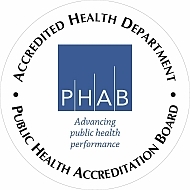Fight the Bite
Protect yourself and others from West Nile Virus (WNV) and Eastern Equine Encephalitis (EEE).
Mosquito bites can spread diseases like WNV and EEE. Mosquito-borne disease is spread by the bite of an infected mosquito.
Who is most at risk?
Adults over 50 years old and children younger than 15 are the most at risk of becoming severely ill from infection.
What are the signs and symptoms?
Most people who are infected with WNV or EEE do not develop any signs or symptoms. However, both WNV and EEE are potentially serious illnesses. Signs and symptoms can include high fever, headache, neck stiffness, confusion, tremors (shaking), convulsions, muscle weakness, vision loss, irritability, drowsiness, numbness, paralysis, vomiting, diarrhea, and coma. Consult your healthcare provider if you have been bitten by a mosquito and develop any of these signs and symptoms.
What about spraying?
Visit our Frequently Asked Questions About Aerial Mosquito Spraying to learn more.
Found a dead bird?
The New York State Department of Health is no longer testing birds for West Nile virus. West Nile virus is present in all areas of New York State. If you find a dead bird, wear disposable gloves and:
- pick up the bird
- put it in a plastic bag and double bag it
- then throw it in your garbage can.
Protect Yourself and Protect Others
Get rid of water!
- Mosquitoes need water to multiply. Get rid of any standing water around your home.
Don’t let them in!
- Make sure all windows and doors have screens. Repair any broken screens.
Protect yourself when outdoors!
- Mosquitoes are most likely to bite at dusk and dawn. If you spend time outdoors during these hours, wear long pants, a long-sleeved shirt, shoes, and socks. Spray clothing and shoes with products containing permethrin.

Use repellent! Follow these tips:
- Use this EPA search tool to help you choose the repellent product that is right for you, and follow the manufacturer’s instructions on proper use for safety and effectiveness.
- Ideally, choose a repellent with 20% picaridin or 10%–30% concentration of DEET (look for N,N-diethyl-m-toluamide on the label). The higher the concentration of DEET, the longer it lasts.
- The American Academy of Pediatrics (AAP) recommends that repellents should contain no more than 30% DEET when used on children.
- Repellent should not be used on babies younger than 2 months old.
- Mosquito repellent diffusers repel mosquitoes in the air and can be quite effective at reducing the number of mosquitoes in your immediate area. Diffusers, alone or in combination with repellants applied to the skin, may offer additional protection.
- Treat clothing and gear with products containing 0.5% permethrin. Permethrin can be used to treat boots, clothing, and camping gear and remain protective through several washings. Alternatively, you can buy permethrin-treated clothing and gear.
|
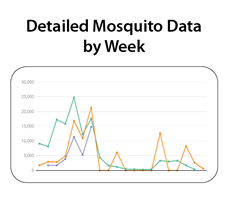
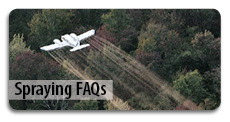
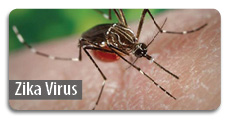
|
Do you have stagnant water on your property?
Mosquitoes breed in stagnant water (water which is not in motion or has no flow). If you have areas of stagnant water around your home such as on top of your swimming pool cover, rain barrel, or bird bath, you may want to consider treating the water with mosquito dunks.
Mosquito dunks contain bacteria that kill mosquito larvae. They do not kill adult mosquitoes. Mosquito dunks can be purchased at your local hardware store. The dunks can only be used for containerized standing water and cannot be used for any type of flowing water such as a stream or pond. Please follow the manufacturer’s directions on the package for safe and proper use.
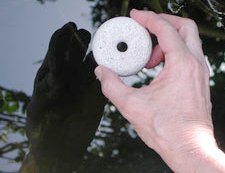
Mosquito dunk being placed
in stagnant water |

